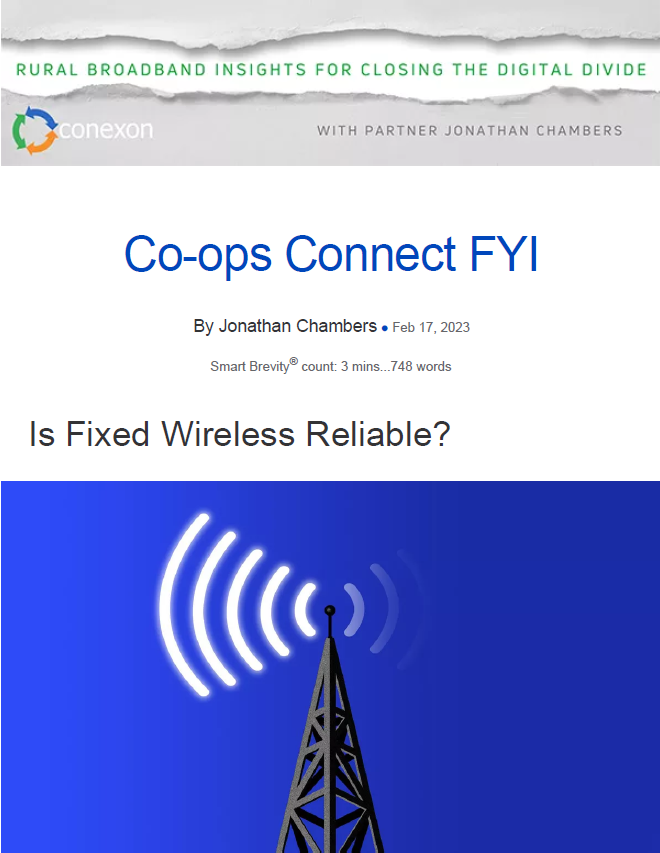Is Fixed Wireless Reliable?
February 17, 2023
According to the Infrastructure Act, “reliable broadband service” is defined as:
RELIABLE BROADBAND SERVICE.—The term ‘‘reliable broadband service’’ means broadband service that meets
performance criteria for service availability, adaptability to changing end-user requirements, length of serviceable life, or other criteria, other than upload and download speeds, as determined by the Assistant Secretary [of Commerce] in coordination with the [Federal Communications] Commission.
In other words: Speed alone is not sufficient.
So, what does reliability mean for BEAD?
- If NTIA and the FCC determine a service is not reliable, then the geographic areas covered only by such service will be considered unserved under the BEAD programs.
- Most of the funding eligibility focus has been on maps and speeds.
- The bottom line: The determination of reliability will impact both the allocation of BEAD funds and eligibility for funding.
The Big Questions for T-Mobile
NTIA has already determined that Starlink is not reliable broadband service.
- Otherwise, if Starlink’s claims were believable (and they aren’t), not much of the country would be eligible for BEAD funding.
What about T-Mobile’s Home Internet service, the most widely available fixed wireless home internet service in the country? (According to T-Mobile, that is.)
Speeds?
- According to the T-Mobile website, customers of T-Mobile Home Internet service “See typical download speeds between 33-182 Mbps” and “Upload speeds are between 6 Mbps and 23 Mbps.”
- So, which is it? On the low end, the service is 33/6 Mbps and on the high end, it is 182/23 Mbps.
- Does one speed relate to 5G and one to 4G LTE? T-Mobile Home Internet service connects to T-Mobile’s 4G LTE or 5G networks for mobile service, depending on signal availability at your address.
- The bottom line: Those are weirdly specific numbers for such a wide range. But are they reliably true speeds? Is the service reliable broadband?
Why it matters: If T-Mobile’s fixed wireless service is considered reliable broadband, the reported speeds are consequential.
- At 100/20 Mbps, large rural areas will be blocked from funding.
- At 25/3 Mbps, T-Mobile’s reporting will impact state broadband allocations.
What does T-Mobile report to the FCC? It splits the difference and reports 100/10 Mbps in some places and 25/3 Mbps in other places.
The question posed by the FCC’s Broadband Data Collection:
What is the maximum advertised speed?
The Question of T-Mobile’s Advertised Claims
Just because a speed is advertised and reported to the FCC as such doesn’t mean it is reliably true.
Are T-Mobile’s advertisements reliable?
- According to the National Advertising Division (NAD) of the Better Business Bureau, no.
- In a finding last month, the NAD determined that T-Mobile Home Internet (T-HINT) service was neither “fast” nor “high-speed” nor “reliable.” Ouch.
With respect to upload and download speeds, NAD found:
“Customers experience a range of speeds. NAD determined that T- Mobile did not provide sufficient evidence to conclude that all T- HINT customers receive speeds above the Federal Communication Commission’s standards for high-speed broadband internet and thus did not provide a reasonable basis of support for its ‘fast’ or ‘high-speed’ claims.”
With respect to reliability, NAD found:
“T-Mobile’s claims that T-HINT is ‘reliable’ may convey the messages that T-HINT customers will maintain a dependable internet connection and that T-HINT consistently delivers fast speeds and service without disruption. NAD determined that T- Mobile did not provide a reasonable basis to support these messages.”
What’s next: T-Mobile is appealing NAD’s conclusions, which is of no consequence to the BEAD program. The FCC and NTIA determine the question of reliability for BEAD.
The $42.5 Billion BEAD Question
Do NTIA and/or the FCC consider T-Mobile’s service to be reliable?
- That determination will impact billions in state allocations and billions in public funds.
The big picture:
- T-Mobile’s service limitations are no different than Verizon’s fixed wireless internet service or other fixed wireless internet services.
- These services are inherently unreliable.
- And yet, the government is preparing to block BEAD funding to areas “served” by fixed wireless.
- We shouldn’t need to rely on the Better Business Bureau to do a job that is the province of the FCC and NTIA.
- If the FCC or NTIA won’t do their jobs, perhaps we should turn to those who police false advertising claims, including the FTC and state attorneys general.
To put this in terms T-Mobile understands, the un-carrier’s service is un-reliable, which means rural areas remain un-served.

